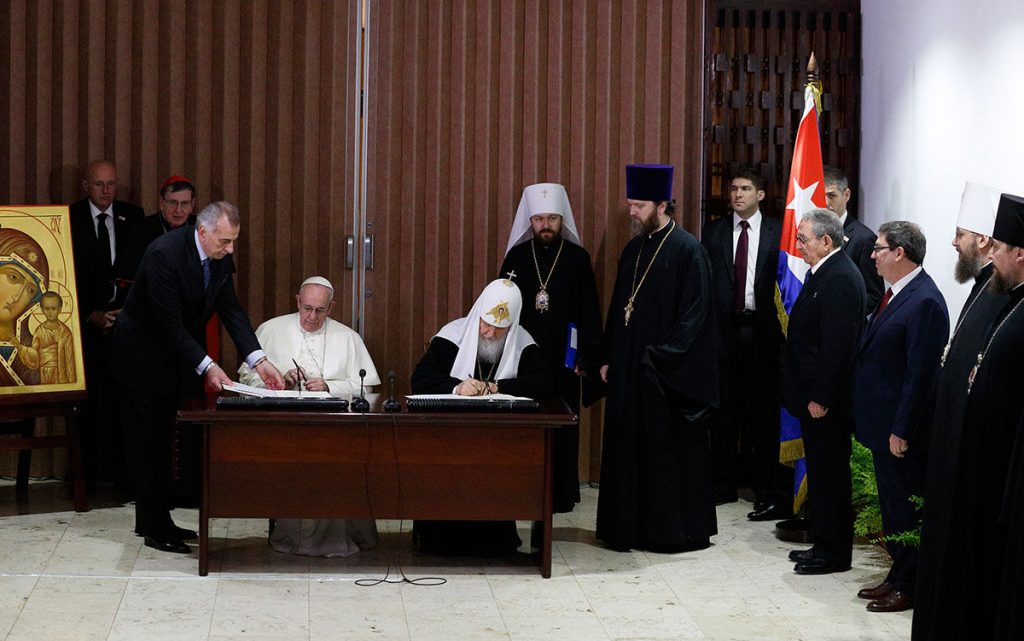The meeting of Russian Orthodox Patriarch Kirill and Pope Francis in Havana Feb. 12 marked the first time leaders of these churches had ever met.
Pope Francis, en route to Mexico, stopped in Cuba to meet with Kirill, who was in the Caribbean nation for an official visit. While news of the historic meeting came just this month, Vatican officials said the encounter was the result of a “long preparation.”
"The pope always speaks about a 'culture of encounter,'" Jesuit Father Federico Lombardi said at the evening press conference in Mexico City. "This was the first time the leaders from these two great churches encountered each other. It was a great step forward in the ecumenical movement."
The encounter also comes before the Pan-Orthodox Council later this year, which will bring together leaders from all the Orthodox churches, Father Lombardi said.
Kirill and Francis met for two hours before signing a joint declaration. They both gave brief comments to the press.
Kirill described the exchange as “open communication” in which the two leaders came to better understand how they could collaborate in the future. Such a collaboration benefits the future of civilization, he said.
“We spoke as brothers,” Francis said. “We share the same baptism. We are both bishops.”
In the joint declaration itself, the Orthodox and Catholic leaders made clear that obstacles to unity remained, but expressed their hope that such obstacles could be overcome.
“We have been divided by wounds caused by old and recent conflicts, by differences inherited from our ancestors, in the understanding and expression of our faith in God, one in three persons — Father, Son and Holy Spirit,” the joint declaration read. “We are pained by the loss of unity, the outcome of human weakness and of sin.”
Yet Kirill and Francis declared their intention to “overcome the historical divergences we have inherited,” finding unity in their witness to the Good News of Jesus Christ.
“Human civilization has entered into a period of epochal change,” the leaders said. “Our Christian conscience and our pastoral responsibility compel us not to remain passive in the face of challenges requiring a shared response.”
In the declaration itself, Kirill and Francis spoke much about the persecution of Christians in North Africa and the Middle East, while also recognizing their agreement on marriage and sanctity of life issues.
“In raising our voice in defense of persecuted Christians, we wish to express our compassion for the suffering experienced by the faithful of other religious traditions who have also become victims of civil war, chaos and terrorist violence,” they said, noting in particular conflicts in Iraq and Syria.
Kirill and Francis also called for the faithful in Ukraine to work “to work towards social harmony, to refrain from taking part in the confrontation, and to not support any further development of the conflict.”
“We are not competitors but brothers, and this concept must guide all our mutual actions as well as those directed to the outside world,” they said in the declaration. “We urge Catholics and Orthodox in all countries to learn to live together in peace and love.”
Pope Francis thanked Cuban president Raul Castro for is cooperation in the meeting, as well as the Cuban people.
“If it continues this way,” the pope said, “Cuba will be the capital of unity.”

